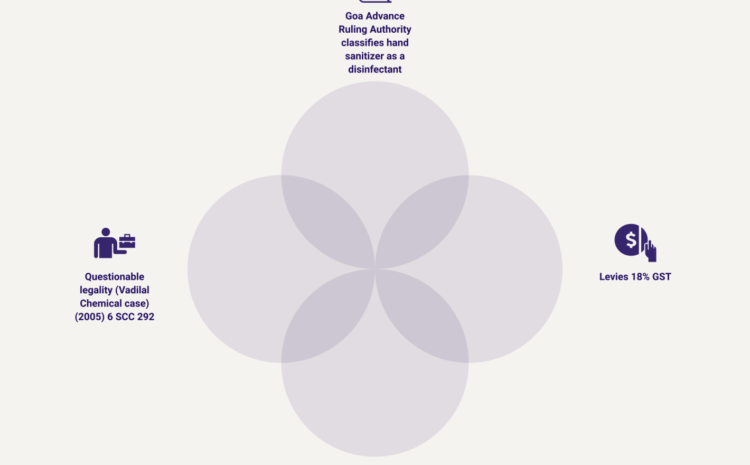
The Supreme Court, High Courts and Advance Ruling Authorities hand down scores of indirect tax decisions each week. I read them and summarize one case each week.
Hand sanitizer is an important tool in our battle against COVID-19.
The Goa Authority for Advance Ruling has recently held that alcohol-based hand sanitizers are to be taxed at 18% instead of 12% under the GST regime.
Background
Springfields (India) Distilleries, Raia Salcete had filed an application for an advance ruling before the Goa Authority for Advance Ruling (“GAAR”) on the question whether hand sanitizer ought to be taxed at 12% under HSN 30049087 or 18% under HSN 3401 30.
The applicant urged the GAAR to classify the product under 12% instead of 18%. The applicant referred to two entries and argued that hand sanitizer could be classified under any one of them at 12%.
On the other hand, the GAAR referred to three entries before holding that hand sanitizer should be classified under one of those entries at 18%.
Here are the entries for reference:
Without going into detailed analysis, the GAAR held that alcohol-based hand sanitizers are classifiable under 3808 under “disinfectants and similar products”. The GAAR took note of the fact that although hand sanitizers were classified as an essential commodity by the Ministry of Consumer Affairs, Food and Public Distribution Authority, “merely classifying any goods as essential commodities will not be a criteria for exempting such goods from GST.”
The Ministry of Finance was quick to issue a Press Note dated 15th July 2017 to argue that the since the inputs required for manufacturing hand sanitizer attract GST at 18%, levying 12% GST on hand sanitizers would create an inverted duty structure and would ultimately hurt domestic manufacturers vis-à-vis importers.
Whether this is sound economic reasoning or not is not quite within the scope of this article. However, the legality of the decision is questionable.
Assuming for a moment that the Ministry of Consumer Affairs, Food and Public Distribution Authority has in fact exempted levy of tax on hand sanitizers, the government is guilty of taking inconsistent stands. The government cannot say in one breath that hand sanitizers are exempt from tax and in the other breath levy 18% GST by issuing Press Notes and Advance Rulings.
The government is required to speak in one voice when it makes a decision. It cannot be the case that the left hand of the government is unaware of what the right hand of the government is doing.
In this context, see Vadilal Chemicals, (2005) 6 SCC 292
It is also crucial to note that the finding of the advance ruling does not apply to all manufacturers and distributors of hand sanitizer. Under Section 103 of the CGST Act, the finding only to applies to (i) the applicant-company that filed the application (i.e. Springfields (India) Distilleries, Raia Salcete) and (ii) on the jurisdictional officer where the applicant-company is registered.
Here is the relevant portion of the Section 103 of the CGST Act, 2017:
103. (1) The advance ruling pronounced by the Authority or the Appellate Authority under this Chapter shall be binding only—
(a) on the applicant who had sought it in respect of any matter referred to in sub-section (2) of section 97 for advance ruling;
(b) on the concerned officer or the jurisdictional officer in respect of the applicant.
(2) The advance ruling referred to in sub-section (1) shall be binding unless the law, facts or circumstances supporting the original advance ruling have changed.
Therefore, manufacturers and distributors of hand santizers in other parts of the country are not duty bound to charge and collect 18% on the sale of hand sanitizers.
To read the full decision, see the link in the comments.
For GST updates on Mobile, I have created a LinkedIn Group and Facebook Group with the following link:
- LinkedIn Group at: https://www.linkedin.com/groups/8957439/
- Facebook Group at: https://www.facebook.com/groups/763266794437796/




